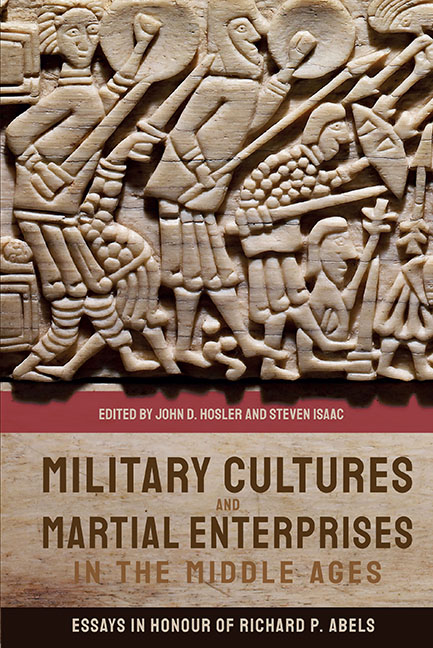Book contents
- Frontmatter
- Contents
- List of Illustrations
- Notes on Contributors
- Introduction and Appreciation
- 1 Charlemagne’s Invasion of Spain in 778: The Anatomy of a Strategic Failure and its Impact
- 2 Military Intelligence and Strategic Planning Under the Ottonian Kings of Germany, 919–1024
- 3 Ain’t Nobody Here But Us Chickens: Defeated Warriors, Masculinity, and Mistaken Identity in Western Europe, 679–1141
- 4 Count Baldwin V of Flanders: Broker of Eleventh-Century Power
- 5 Kings and Fortuna: The Meanings of Brémule
- 6 Fighting the Last War: Remembering the Norman Conquest during the Anarchy
- 7 Gilbert of Mons’ Chronicle of Hainaut as a Source for Military History in the Twelfth Century
- 8 At Home with Roger of Howden
- 9 Embedded Reporters? Ambroise, Richard de Templo, and Roger of Howden on the Third Crusade
- 10 The Treatment of Male and Female Prisoners of War during the Third Crusade
- 11 Exempla, Crusade, and Chivalry
- 12 Frontier Warfare in the St Omer Chronicle
- 13 Some Observations on the Training of Medieval Warhorses
- Richard P. Abels’ Curriculum Vitae
- Index
- Tabula Gratulatoria
4 - Count Baldwin V of Flanders: Broker of Eleventh-Century Power
Published online by Cambridge University Press: 21 October 2020
- Frontmatter
- Contents
- List of Illustrations
- Notes on Contributors
- Introduction and Appreciation
- 1 Charlemagne’s Invasion of Spain in 778: The Anatomy of a Strategic Failure and its Impact
- 2 Military Intelligence and Strategic Planning Under the Ottonian Kings of Germany, 919–1024
- 3 Ain’t Nobody Here But Us Chickens: Defeated Warriors, Masculinity, and Mistaken Identity in Western Europe, 679–1141
- 4 Count Baldwin V of Flanders: Broker of Eleventh-Century Power
- 5 Kings and Fortuna: The Meanings of Brémule
- 6 Fighting the Last War: Remembering the Norman Conquest during the Anarchy
- 7 Gilbert of Mons’ Chronicle of Hainaut as a Source for Military History in the Twelfth Century
- 8 At Home with Roger of Howden
- 9 Embedded Reporters? Ambroise, Richard de Templo, and Roger of Howden on the Third Crusade
- 10 The Treatment of Male and Female Prisoners of War during the Third Crusade
- 11 Exempla, Crusade, and Chivalry
- 12 Frontier Warfare in the St Omer Chronicle
- 13 Some Observations on the Training of Medieval Warhorses
- Richard P. Abels’ Curriculum Vitae
- Index
- Tabula Gratulatoria
Summary
I ENCOUNTERED COUNT BALDWIN V of Flanders when he became the subject of my first graduate school paper in 1981. I became immediately interested in a man who was so important to the history of the eleventh century. I fully intended to present my paper on Baldwin at a conference and publish it in the near future.
That this “near future” turned into the Haskins Society Conference in 2002, and this publication in 2020, is due indirectly to Richard Abels. Richard's influence came in talking with him during my second visit to the International Congress on Medieval Studies at Western Michigan University. At that conference my interest in eleventh-century northern Europe first encountered the large number of graduate students then working on that period with Warren Hollister. Professor Patrick Geary, who moderated the session in which I gave my first paper, suggested that I might find the later Middle Ages more fruitful for my research, especially with my ability to read Dutch. Later in the conference, I asked Richard his opinion, and he agreed.
I have only looked back twice since then: in 1999, when I published my greatly changed undergraduate thesis as a book, The Norwegian Invasion of England in 1066, and in 2001, when I placed an article, “Harold Godwinson in Wales” in The Normans and their Adversaries at War: Essays in Memory of C. Warren Hollister, which was co-edited by Richard. This is a third “look-back.”
Baldwin V was linked to everything important that was happening in the middle of the eleventh century, in Denmark, the Holy Roman Empire, the Papacy, Hainaut, Brabant, Holland, France, Boulogne, Normandy and, especially, England, but the count of Flanders remains forgotten to the historical world. Historians have always been more than willing to herald the political and military power of certain men in northern Europe during the mid-eleventh century. Háraldr Harðráði of Norway, Sveinn Estriðson of Denmark, Godwin and Harold Godwinson of England, William the Conqueror of Normandy, Henry I of France, and Henry III of the Holy Roman Empire all exhibit traits of what I have elsewhere called “militarily legitimate warlords,” individuals who realized that they needed to secure their political power with a strong hand, often demonstrated by offensive military victory against a neighboring threat or, equally important, a sustained defense against that same threat.
Information
- Type
- Chapter
- Information
- Military Cultures and Martial Enterprises in the Middle AgesEssays in Honour of Richard P. Abels, pp. 81 - 98Publisher: Boydell & BrewerPrint publication year: 2020
